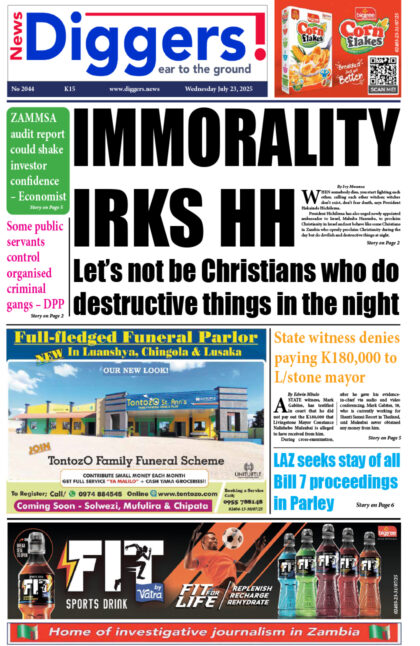A CONSORTIUM of Civil Society Organizations (CSOs) say members of parliament should choose and embrace public service by rejecting the Constitution Amendment Number 10 of 2019 when Parliament resumes sitting next week.
In a statement signed by Chapter One Foundation executive director Linda Kasonde, Tuesday, CSOs urged parliamentarians from all sides to reject the controversial Bill.
“Parliament resumes its sittings on 9th June, 2020, and with it the threat of the enactment of the Constitution Amendment Bill No 10 of 2019 (Bill 10) looms once more. Once again, the mettle of our members of parliament will be tested; will they side with the people of Zambia? We recognize that many Zambians may not realize what is at stake if Bill 10 is enacted. Why does it matter that our Constitution is being amended? How will it affect ordinary Zambians? The Constitution of any country is a social contract binding all the citizens of that country as how they choose to be governed. Everybody in the country, including the most powerful among us, are bound by the Constitution. The Constitution limits the powers of those whom we choose to govern our country,” read the statement.
“The Constitution is also the golden standard by which all other laws in Zambia must be tested. For example, we argue that the Public Order Act, which has been abused by successive governments, does not meet the constitutional standard of being necessary in a democracy, like Zambia as provided in Article 8 of the Constitution. As Parliament resumes we ask: will our members of parliament choose to be servants of the people or will they choose to oppress the people whom they are meant to serve. That is the choice of facing them on 9th June, 2020. As Zambians are concerned with the welfare and well-being of Zambia and its citizens, we urge our members of parliament to choose service by rejecting Bill 10. The whole nation is depending on you to choose our people over your own political interests. As Mathew Chapter 23, Verse 11 states: ‘the greatest among you shall be your servant’.”
Kasonde observed that the country made several constitutional amendments controlled by political parties in power, which lacked transparency.
“What Zambians needs to ask themselves is what happens if the people whose powers are meant to be limited by the Constitution control the process of constitutional amendments instead of the people to whom the Constitution belongs? The answer has been observed repeatedly. Zambia has made several constitutional amendments since 1964 and most of those processes have been controlled by political parties in power. The results have been reduced transparency, reduced accountability and subsequently reductions in the checks and balance over government. The people of Zambia have been poorer for it – literally,” Kasonde observed.
“The people whom we vote for and entrust to oversee the affairs of the nation become less accountable to us. The people whom we vote for and entrust to oversee the affairs of our nation become less accountable to us. For example, Bill 10 proposes the removal of the constitutional provisions on the National Assembly’s’ oversight over the contraction of debt. That will mean that the Zambian people will not be able to hold those in government to account for racking up billions of kwacha in debt that us and future Zambians will be paying for. That will come at the expense of providing basic services like health, education, housing and water and sanitation that most Zambians are currently being deprived of.”
She also questioned the need for government to amend the Constitution when it was not proposed by Zambians in the first place.
“The Zambian Constitution was amended extensively in 2016, only four years ago. By and large, the amendments made in 2016 reflected the will of the Zambian people through a consultative process. While the 2016 Amendment was not perfect and had inconsistencies that required attention, there was never a call nor a justification for the fundamental amendment to the Constitution that Bill 10 represents. The question we ask is: whose interest is the current political administration pushing for the most fundamental change to the Constitution ever done since 1972?” wondered Kasonde.
“Why is it being proposed that we change how we vote? Why is the government seeking to increase the powers of an already powerful President? Why reduce the powers of Parliament over debt contraction and other oversight roles? The question the organizations represented here ask is simply: why are these changes that Zambia did not ask for being proposed?”
Among the CSOs, which signed the statement included: ActionAid Zambia; Alliance for Community Action (ACA); Caritas Zambia; Chapter One Foundation; CiSCA; Centre for Trade Policy and Development (CTPD) and Zambia Council for Social Development (ZCSD).



















